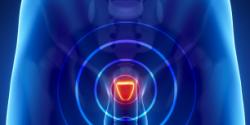Prostate Cancer Treatment in Israel

The vast majority of prostate cancers are adenocarcinomas, which develop from cells that make the prostate fluid. The disease tends to progress slowly. When it does metastasize, it most commonly spreads into the lymph nodes and bones.
Prostate Cancer Causes & Symptoms
Risk factors include age, family history, ethnicity and geography (the disease is more common in North America and Western Europe and in the Caribbean). Common symptoms include urinary symptoms such as nocturia (night-time urination), hematuria, and weak urine stream. Bone and back pain, and unexplained weight loss may appear if the disease has metastasized.
Sample Program
Diagnostics:
- Lab tests: Extensive blood work including tumor markers, urinalysis
- Urinary tract ultrasound scan (including PVR measurement)
- Oncological urologist consultation
- Bone scintigraphy (optional)
- TRUS-guided prostate biopsy (if required)
The aforementioned investigations can be completed within 5 business days.
Treatment:
Depending on the results of the investigations, your treating physician will refer you for one of the following:
Option 1 (benign tumor):
TURP (transurethral resection of the prostate) – a surgical procedure indicated in cases of benign (not cancerous) prostate enlargement (AKA benign prostatic hyperplasia or BPH) when severe urinary dysfunction significantly impairs the quality of the patient's life.
You will need to remain in Israel for 7 days following your discharge.
Option 2:
Radical prostatectomy (open or laparoscopic) – indicated for patients aged 50 to 70, who were diagnosed with an adenocarcinoma. Please note that the cost of treatment varies depending on the type of operation.
Since you are discharged with a urinary catheter, you will need to remain in Israel for 10 days following your discharge for outpatient observation. The catheter will be removed by your treating urologist on post-operative day 14.
Option 3:
Brachytherapy may be indicated when adenocarcinoma of the prostate with low Gleason score is diagnosed. It is an alternative to prostatectomy surgery, often recommended for patients under 55. It is a relatively new and advanced cancer treatment that involves placement of special radioactive seeds in or near the tumor. This allows delivering a high radiation dose while reducing the damage to surrounding healthy tissues.
In Israel, the facility that specializes in this type of treatment is Sheba Medical Center, which has over 10 years of experience with the technique.
Option 4:
Radiotherapy and hormonal treatment – this method is used when mets are suspected or observed and in patients over the age of 65. Normally, an RT course will consist of approximately 35 to 42 sessions; its cost depends on size of the area that needs to be irradiated.

















 Toronto:
Toronto:  London:
London: 



